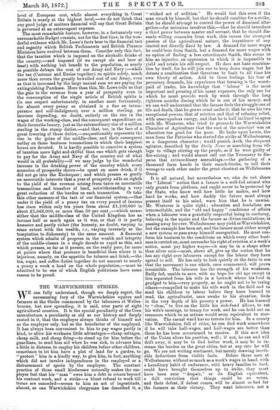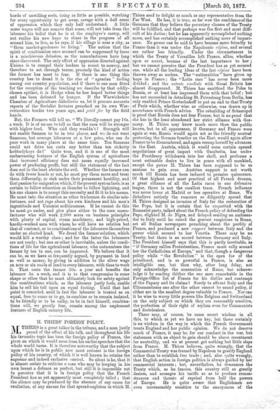THE WARWICKSHIRE STRIRES.
WE can fully understand, though we deeply regret, the unreasoning fury of the Warwickshire squires and farmers at the Strike commenced by the labourers of Welles- bourne, but now spreading, it is said, over parts of eight agricultural counties. It is the special peculiarity of the Corn manufacture, a peculiarity as old as our history and deeply rooted in it, that the employer always thinks of himself not as the employer only, but as the benefactor of the employed. It has always been convenient to him to pay wages partly in kind, to allow his workmen little advantages—cheap cottages, cheap milk, and cheap firing—to stand up for him before the guardians, to send him aid when he was sick, to advance him a little in distress, to employ his children before other children, sometimes to let him have a plot of land for a garden, to " protect " him in a kindly way, to give him, in fact, anything which did not involve independence in the employed or a disbursement of specie by the employer. The constant practice of these small kindnesses naturally makes the em- ployer feel that his "man" owes him a debt in return beyond his contract work, and a strike—a blunt refusal to work till terms are conceded—seems to him an act of ingratitude, almost, as one Warwickshire clergyman has described it, a
"wicked act of sedition." He would feel this even if the man struck by himself, but that he should combine for a strike, that he should attempt to control the power of dismissal alto- gether—for unionism involves this,—that he should introduce a third power between master and servant, that he should dis- suade willing comrades from work, this rouses the strongest passion of the agricultural nature, the impatience of any control not directly fixed by law. A demand for more wages he could bear from Smith, but a demand for more wages with no option of finding a less extortionate Smith, this seems to him an injustice, an oppression to which it is impossible to yield and retain his self-respect. He does not hate combina- tion by itself, for he will join one to keep down wages, but he detests a combination that threatens to limit to all time his own liberty of action. Add to these feelings his fear of pecuniary demands, his experience that farming is the worst- paid of trades, his knowledge that " labour " is the most important and pressing of his many expenses, the only one for which he must provide week by week through the long eighteen months during which he is out of his money, and we can well understand that the farmer feels the struggle one of life and death, that he grows cruel under it, that he uses his two exceptional powers, that of eviction and that of refusing relief, with unscrupulous energy, and that he is half inclined to agree with Mr. Westover, who tried to persuade the Warwickshire Chamber of Agriculture that the root of the mischief was an education too good for the poor. He looks upon Lewis, the man from the Potteries who started the strike at Wellesbourne, as a dangerous character ; would punish Arch, the eloquent agitator, described by the Daily News as marching from vil- lage to village stirring up the people, as if he were guilty of fire-raising ; and would almost call out the Yeomanry to dis- perse that extraordinary assemblage,—the gathering of a thousand farm hands in their smock-frocks, to tell their wrongs to each other under the great chestnut on Wellsbourne Green.
It is all natural, but nevertheless we, who do not share the " Liberal " notion that a farmer is a well-fed animal who only grunts from plethora, and ought never to be protected by the State, who know well how little he makes, and how hard he works, and how darkly the future must always present itself to his mind, warn him that he is unwise. Mr. Westover is quite right ; education and feudalism are irreconcilable, and the "old and happy" conditions of affairs when a labourer was a gratefully respectful being in corduroy, believing in the squire and the farmer as divine institutions, is passing away for ever. Wellesbourne may yield or Warwickshire, but the example has been set, and the farmer must either accept a new system or pass away himself unregretted. He must con- form his business to the conditions on which every other busi- ness is carried on, must surrender his right of eviction at a week's notice, must pay higher wages—it may be in a shape other than silver coin—must, above all, give up the notion that he has any right over labourers except for the labour they have agreed to sell. He has only to look quietly at the facts to see that the movement is one which, once commenced, will prove irresistible. The labourer has the strength of his weakness.
Badly fed, unable to save, with no hope for old age except to live separated from his wife in a barrack where his food is grudged to him—very properly, as he ought not to be taxing others—compelled to make his wife work in the field and to send his children to labour before they have learned to read, the agriculturist, once awake to his situation, finds in the very depth of his poverty a power. He has learned to "clew," to live on the little his sick-fund allows, to eat his wife's earnings, to tramp for work, and he can hold out on resources which to an artisan would seem equivalent to star- vation. The casual ward has no terrors for him. In a county like Warwickshire, full of cities, he can find work somewhere if he will take half-wages, and half-wages are better than those he has been accustomed to receive. If this new idea of the Union alters his position, well ; if not, he can and will drift away, it may be to find better work, it may be to in- crease the burden on the great cities, but at any rate he will go. We are not writing sentiment, but merely drawing inevit- able deductions from visible facts. Before these men at Wellesbourne, without so much as a week's wages in hand, with a hereditary habit of endurance, with heavy families to feed, could have brought themselves up to strike, they must
have been near "despair," or its English equivalent, a dull conviction that things could be no worse,
and their defeat, if defeat comes, will be almost as bad for the farmers as their victory. They want labourers, not a horde of unwilling serfs, doing as little as possible, watching for every opportunity to get away, savage with a dull sense of oppression which they only half understand. A little more wages will not remove that sense, will not take from the labourer his belief that he is at the employer's mercy, will not realise his new hope to share in the progress of all around him, to live, as he says, if his village is near a city, as "them market-gardeners be living." The notion that the spirit of combination once aroused can be suppressed by force is a mischievous delusion, as the manufacturers have long since discovered. The only effect of oppression directed against Unions is to compel their leaders to resort to secrecy, and therefore to act through terror, precisely the kind of action the farmer has most to fear. If there is one thing this country has to dread it is the rise of " agrarian " feeling among our country population, and if there is one man fitted for the reception of the teaching we describe by that oddly- chosen epithet, it is Hodge when he has hoped better things and has been defeated by hunger. If the Warwickshire Chamber of Agriculture disbelieves us, let it procure accurate reports of the Socialist lectures preached on its own Wor- cestershire border two years ago, and paid for by the field hands.
But, the Farmers will tell us, "We literally cannot pay 16s. a week. It is of no use to tell us that the men will be stronger with higher food. Who said they wouldn't ? Strength will not enable Samson to be in two places, and we do not want Samsons, but average labourers at a low price, who can do poor work in many places at the same time. Ten Samsons could not drive ten carts any better than ten ricketty hobbedyhoys do r Quite true, and it is one of the most embarrassing features of the English system of agriculture that increased efficiency does not mean equally increased power of producing profit, but still the statement of the fact does not in the least obviate the evil. Whether the farmer can do with fewer hands or not, he must pay them more and treat them differently, or sink under their permanent hostility, and that passion for emigration which, if the present system lasts, is as certain to follow education as thunder to follow lightning, and his one chance is to accept this necessity and fit it to his means. He must take the situation as other tradesmen do similar mis- fortunes, and not rage about his own kindness and his men's ingratitude and Unionist seditiousness. If he cannot do this he must go under, and give place either to the corn manu- facturer who will work 2,000 acres on business principles with plenty of capital, steam machinery, and high-priced, hardly-worked men with whom he will have no relation but that of contract, or to combinations of the labourers themselves under an elected head. We dread the former solution, which would kill a worthy class ; and for the latter the labourers are not ready; but one or other is inevitable, unless the condi- tions of life for the agricultural labourer, who outnumbers the farmer by ten to one, can be improved. We believe that it can be, as we have so frequently argued, by payment in land as well as money, by giving in addition to the silver wage an acre or six roods of land to every labourer, with time to work it. That costs the farmer 30s. a year and benefits the labourer 5s. a week, and it is to that compromise in some shape or other that he must ultimately look for safety against the combinations which, as the labourer justly feels, enable him to sell his toil upon an equal footing. Until that last point is conceded, until in fact the labourer is treated as an equal, free to come or to go, to combine or to remain isolated, to be friendly or to be sulky, to be in fact himself, combina- tions will, we greatly fear, remain among the unpleasant features of English country life.



































 Previous page
Previous page